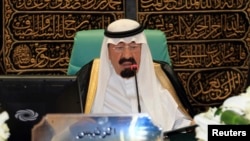WHITE HOUSE —
U.S. President Barack Obama is to visit Saudi Arabia next month after a trip to three European nations. Talks with Saudi King Abdullah will focus on regional security issues, including the Syrian civil war and international negotiations with Iran for a final agreement on its nuclear program.
Saudi Arabia was added to the already announced itinerary for Obama in Europe, including the global Nuclear Summit in The Netherlands, consultations with NATO and the EU in Brussels, and Italy, where he will meet Pope Francis and Italian leaders.
Long close allies, U.S.-Saudi relations have been severely strained. Saudi officials complained bitterly last year about what they saw as Obama's reluctance to intervene militarily in Syria, or to do more to arm rebels.
Riyadh is providing weapons to the rebels. Saudi Arabia also remains concerned about support that Shiite Iran, its chief regional rival, has given to President Bashar al-Assad. Warring Syrian parties recently held inconclusive face-to-face talks in Geneva.
Saudi leaders also are watching closely the P5+1 negotiations with Tehran for a final nuclear deal. Other issues include nervousness about events in Egypt, where there has been ongoing violence ahead of a new election.
White House Press Secretary Jay Carney was asked Monday if scheduling Obama's stop in Riyadh was aimed at carrying out "damage control."
"Saudi Arabia is a close partner of the United States and we have a bilateral relationship that is broad and deep and covers a range of areas, and the president very much looks forward to the visit where all of those areas will be discussed in meetings. And whatever differences we may have do not alter the fact this is a very important and close partnership," said Carney.
In newspaper interviews last year, influential former Saudi intelligence chief and former ambassador to the United States, Prince Turki al-Faisal, strongly criticized U.S. Mideast policy.
This focused on President Obama's approach on Syria, specifically his eventual decision not to use military force in response to Syrian government chemical weapons attacks, and the Iran negotiations.
President Obama and the Saudi monarch spoke by telephone this past November. The White House said Obama "reiterated the firm commitment "of the United States to friends and allies in the Gulf.
Secretary of State John Kerry visited Saudi Arabia last year and again in January as part of efforts to address Saudi concerns, and discuss Mideast peace efforts.
President Obama is scheduled to meet February 14 with King Abdullah of Jordan at the Sunnylands estate in California. Those talks will also focus on Syria, Israel-Palestinian peace efforts and other issues.
Saudi Arabia was added to the already announced itinerary for Obama in Europe, including the global Nuclear Summit in The Netherlands, consultations with NATO and the EU in Brussels, and Italy, where he will meet Pope Francis and Italian leaders.
Long close allies, U.S.-Saudi relations have been severely strained. Saudi officials complained bitterly last year about what they saw as Obama's reluctance to intervene militarily in Syria, or to do more to arm rebels.
Riyadh is providing weapons to the rebels. Saudi Arabia also remains concerned about support that Shiite Iran, its chief regional rival, has given to President Bashar al-Assad. Warring Syrian parties recently held inconclusive face-to-face talks in Geneva.
Saudi leaders also are watching closely the P5+1 negotiations with Tehran for a final nuclear deal. Other issues include nervousness about events in Egypt, where there has been ongoing violence ahead of a new election.
White House Press Secretary Jay Carney was asked Monday if scheduling Obama's stop in Riyadh was aimed at carrying out "damage control."
"Saudi Arabia is a close partner of the United States and we have a bilateral relationship that is broad and deep and covers a range of areas, and the president very much looks forward to the visit where all of those areas will be discussed in meetings. And whatever differences we may have do not alter the fact this is a very important and close partnership," said Carney.
In newspaper interviews last year, influential former Saudi intelligence chief and former ambassador to the United States, Prince Turki al-Faisal, strongly criticized U.S. Mideast policy.
This focused on President Obama's approach on Syria, specifically his eventual decision not to use military force in response to Syrian government chemical weapons attacks, and the Iran negotiations.
President Obama and the Saudi monarch spoke by telephone this past November. The White House said Obama "reiterated the firm commitment "of the United States to friends and allies in the Gulf.
Secretary of State John Kerry visited Saudi Arabia last year and again in January as part of efforts to address Saudi concerns, and discuss Mideast peace efforts.
President Obama is scheduled to meet February 14 with King Abdullah of Jordan at the Sunnylands estate in California. Those talks will also focus on Syria, Israel-Palestinian peace efforts and other issues.





